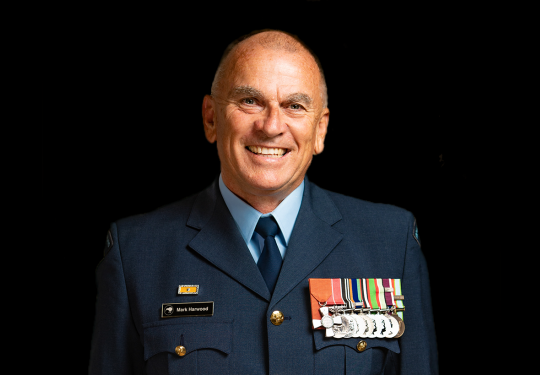Massive effort to keep RNZAF Hercules flying during Gulf War
Warrant Officer Mark Harwood
Current role: Section Commander 230SQN
Length of time in service: 46 years
15 January, 2021
Warrant Officer Mark Harwood was the flight sergeant in charge of the maintenance team for the Royal New Zealand Air Force C-130s during the New Zealand Defence Force’s deployment to the Gulf.
On the 20 December 1990 two C-130s and 48 personnel departed Whenuapai for Riyadh in Saudi Arabia on Operation FRESCO as an Air Transport support force to assist Operation GRANBY – the United Kingdom’s air transport contribution to the operation.
“Arriving at King Khalid International Airport on the 23 December 1990, we set up a make-shift flight line in one of the partially finished terminals and commenced our first mission on the 27th.
“We paused for a very unique Christmas celebration with the NZ Ambassador at a desolate desert valley on the outskirts of Riyadh.
“I remember pondering on what the next few weeks would bring before we headed back to New Zealand for a slightly delayed Christmas with our families and friends – how wrong I would be. It was however, the experience of a lifetime and one of the highlights of my career,” Warrant Officer Harwood said.
For W/O Harwood a stand out of the deployment was what the NZDF team managed to achieve with what was possibly the smallest contingent involved with the coalition forces.
“We completed over 560 sorties, carried over 6,000 passengers and some 5.3 million pounds (2,400 tonnes) of freight.
“Although the ‘team of teams’ delivered this herculean effort, I would like to think that it was the resilient and determined attitude of the maintenance team that kept those two green Hercs in the air for nearly four months.
“Often the specific trades became less obvious when a task needed a united effort. We all learnt a lot about each other’s roles and specialisations and with that came a newfound respect for each other – a real sense of comradery and trust.
“My role as the manager of the maintenance team was relatively easy, as individual motivation and commitment was a gifted bonus. At times it was a challenge to make the team have a well-earned break,” Warrant Officer Harwood said.
However, the deployment was not without its challenges. All of the flying was carried out during daylight hours meaning all the maintenance had to be completed at night.
“Determined to get two serviceable aircraft ready before the aircrew arrived each morning, meant many long and arduous nights by the maintenance team, putting in over 5,000 man-hours in the first six weeks of the deployment.
“Temperatures were in the high 30s during the day and then into negative figures overnight. Then there were the nightly interruptions of Scud missile warnings and attacks that added another level of disruption and anxiety. Everyone got very polished at getting in and out of their NBC (Nuclear, biological, chemical) suits and gas masks. We even managed the odd sleep fully suited.”
